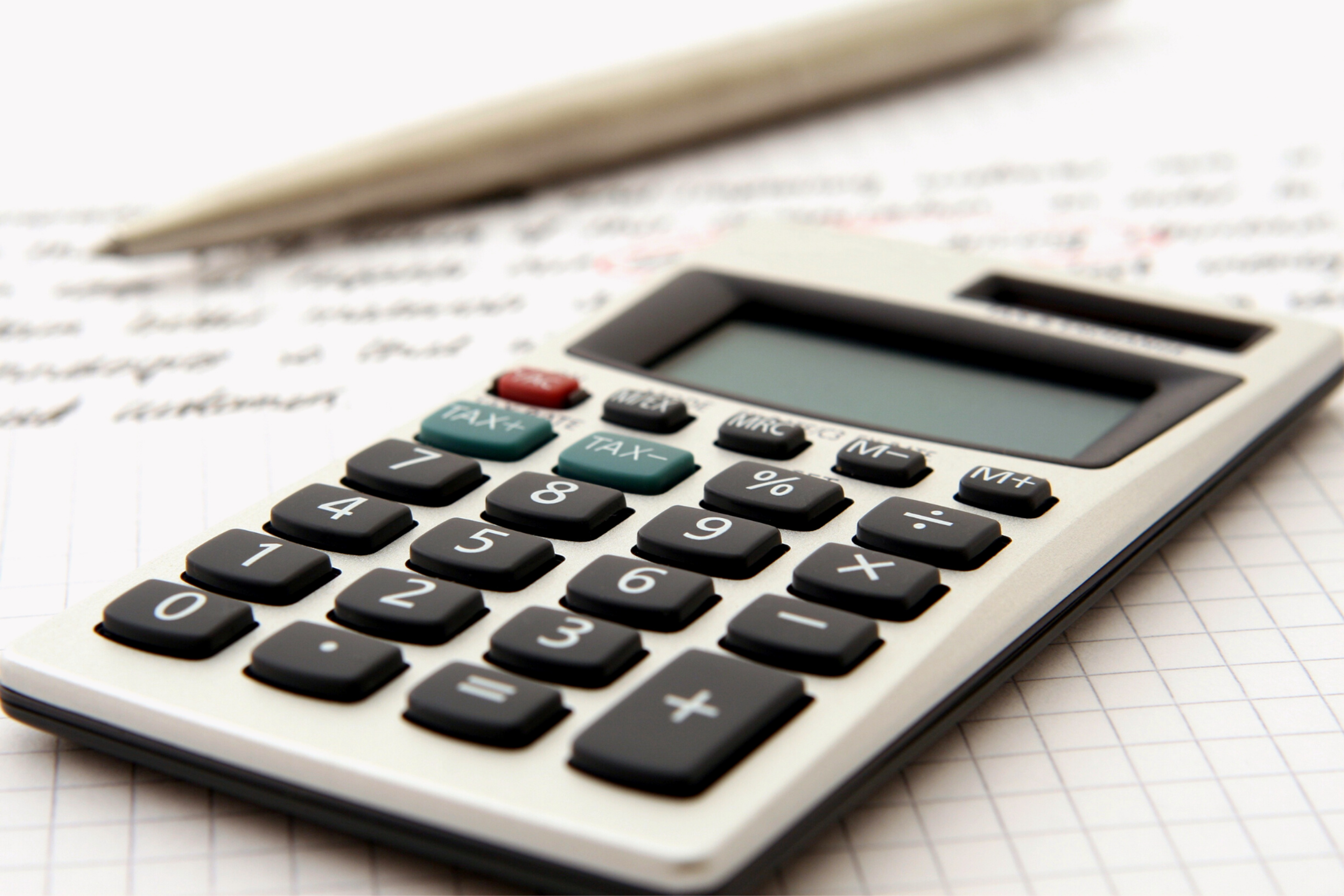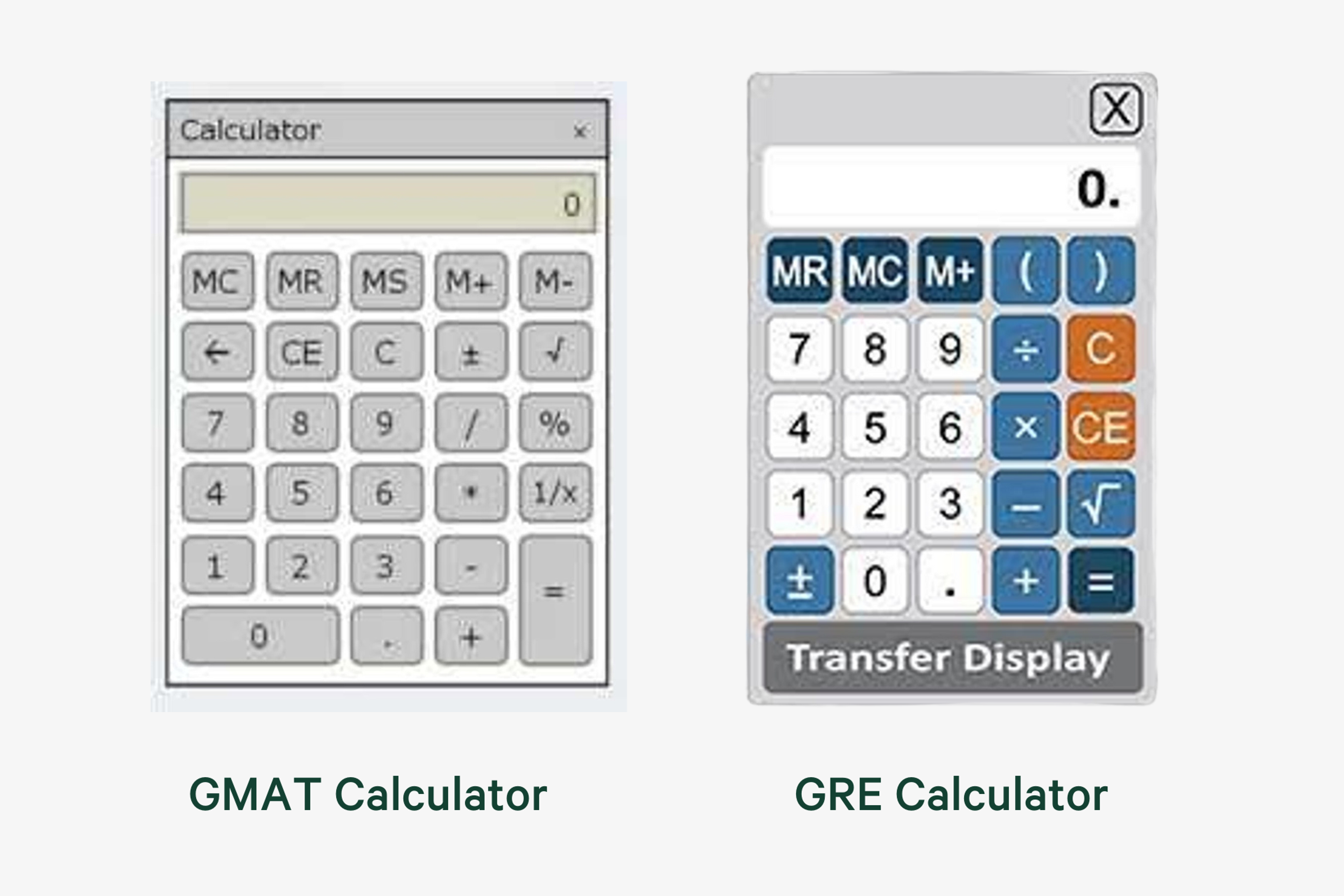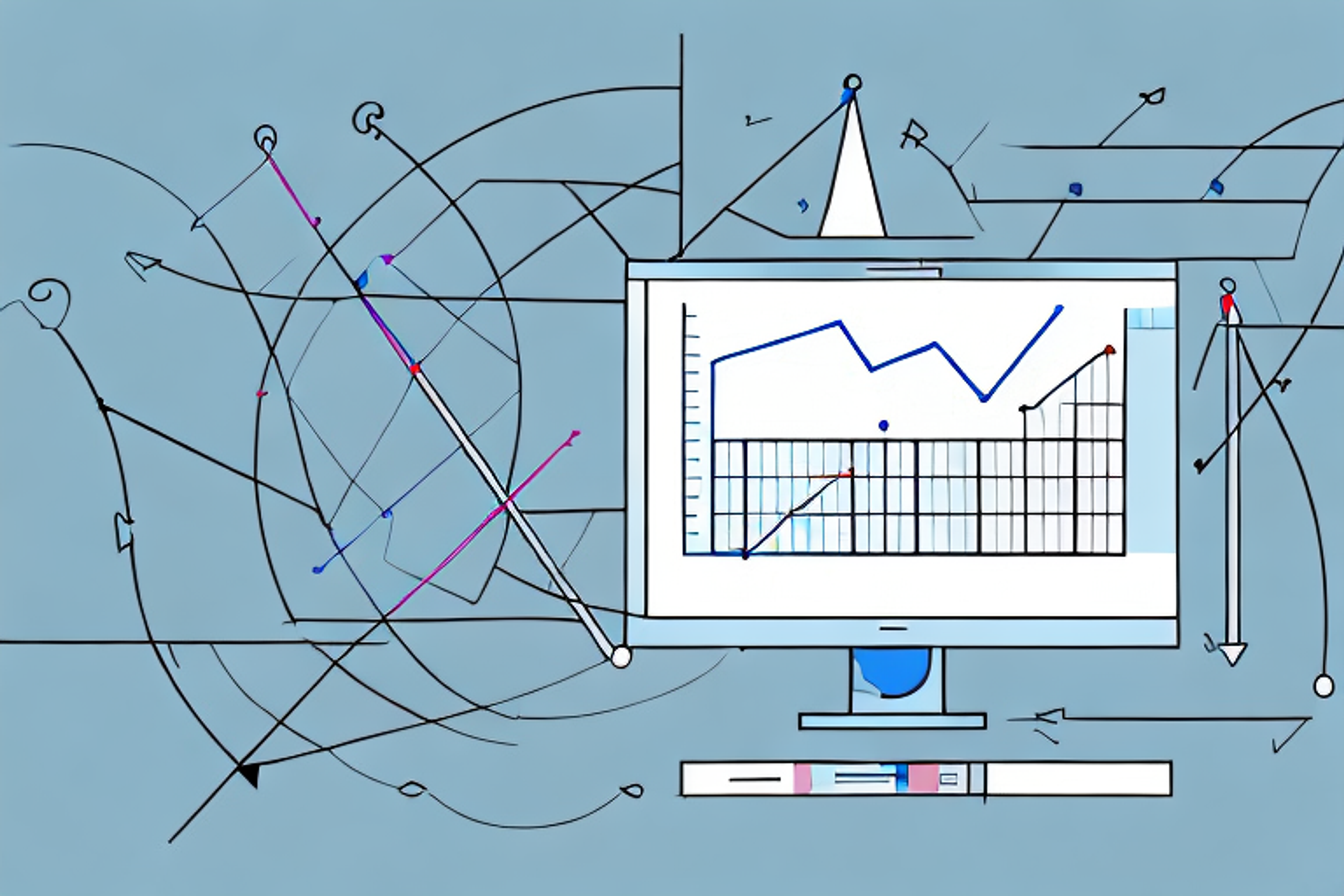Can You Use a Calculator on the GRE/GMAT?
Discover the ins and outs of using calculators on the GMAT/GRE in this comprehensive guide, including when you can use one when you can’t use one, and what else you should know.
Posted March 6, 2025

Table of Contents
Free Event

Featuring Jennifer P.
How to Bounce Back from a Low GMAT score
Starting Tuesday, April 29
4:00 PM UTC · 60 minutes

Featuring Jennifer P.
For aspiring graduate school students, the GRE and GMAT are essential steps toward securing a place in competitive programs. These standardized tests can be challenging, particularly under time constraints, and while calculators are permitted in some test sections, there are specific rules to follow. This guide breaks down calculator use on the GRE and GMAT, detailing where and how you can use them to streamline calculations effectively.
Allowed Use of Calculators on the GRE and GMAT
Can you use a calculator on the GRE?
The online GRE calculator is available during the GRE Quantitative Reasoning section but cannot be used in the Verbal or Writing sections. The on-screen calculator is basic and provided only on the computer screen; bringing personal calculators or using other devices is not allowed. Most questions will not require difficult computation, but it may occasionally be helpful.
Can you use a calculator on the GMAT?
For the GMAT Focus Edition, Calculators are only allowed for the new Data Insights section. It will be provided on the screen, you should not bring your own.
Note: On the old GMAT (pre-Focus Edition) Calculators were allowed during the Integrated Reasoning section of the GMAT only. They were not allowed during the Quantitative Reasoning section. The calculator was provided; you again were not allowed to bring your own.
GMAT and GRE Test Formats
Before diving into the specifics of GMAT and GRE calculator usage, it’s essential to understand both test formats.
GMAT
The GMAT Focus Edition is now the only version of the GMAT available, having replaced the traditional GMAT. This updated version is shorter, with a total testing time of 2 hours and 15 minutes. It is composed of the following three sections:
- Quantitative Reasoning
- Verbal Reasoning
- Data Insights – This is the only section where calculator use is permitted, and an on-screen calculator is provided.
The GMAT Focus Edition streamlines the test by removing the Analytical Writing and Integrated Reasoning sections from the traditional format, emphasizing the core quantitative and verbal skills relevant to business school.
GRE
The GRE has also undergone significant updates, with a shorter version now available. This updated version eliminates several components from the traditional format, including the unscored research section and the "Analyze an Argument" task in the Analytical Writing section. Additionally, the number of questions in both the Verbal and Quantitative Reasoning sections has been reduced, making the test shorter overall.
The revised GRE includes:
- Two Verbal Reasoning sections
- Two Quantitative Reasoning sections
- Analyze an Issue Writing task
For the Quantitative Reasoning sections, an on-screen calculator is available to assist with basic calculations, such as square roots, decimals, and straightforward operations. This calculator is specifically designed to streamline problem-solving without offering advanced functionality.
For more info on the GMAT/GRE, read GMAT vs. GRE for an MBA—Which Should You Take (and How to Ace Both)
Key Tips for Efficient Calculator Use During the GRE and GMAT
Using a calculator on the GMAT and GRE can be beneficial, but using the calculator strategically is a must to avoid common pitfalls.
- Reserve calculator use for complex calculations: For tasks that require operations like square roots or long division, the calculator can save time. However, for simpler problems, manual calculations or mental math may be faster. It’s easy to think using the calculator will be easier when it can actually take more time and be a distraction.
- Double-check inputs: Misentering numbers or pressing the wrong buttons can lead to incorrect answers, so check inputs carefully before pressing the equal sign.
- Use memory functions when necessary: If the GMAT and GRE calculator have memory capabilities, store numbers to simplify multi-step calculations. Just ensure to clear the memory after each question to avoid confusion.
- Avoid over-reliance: The GRE Quantitative Reasoning section is designed to test reasoning and math skills, not just the ability to perform basic calculations. Over-reliance on the calculator can lead to time-consuming errors, particularly for simple calculations.
- Practice with the on-screen calculator: Since the GMAT and GRE calculators are embedded in the test software, it’s beneficial to practice with them during GRE prep sessions. Familiarizing the on-screen calculator can help in understanding its layout and avoid spending precious time on test day figuring out how it works.
- Use mental math when possible: Not every problem in the Quantitative Reasoning sections requires a calculator. Many questions are designed to be solved using mental math or quick paper test calculations. Deciding when to avoid the calculator can enhance pace and focus, especially on straightforward questions.
- Handle decimal points carefully: The calculator display on the GMAT and GRE is basic, so be mindful of decimal placement. Misplaced decimals can lead to wrong answers, which is especially risky in time-pressured situations.
- Use estimations: Where possible, estimate the correct answer first to gauge whether the calculator’s capabilities will add value. If the estimate closely matches the answer choices, skip the calculator and save time.
- Avoid non-numerical functions: The GRE calculator is designed for numbers only; attempting to use it for non-numerical functions or complex scientific calculations may result in an error message.
- Practice common shortcuts: Familiarize common shortcuts for repeated calculations, like storing repetitive values with the memory function or using the decimal point for quick division.
How to Get Familiar With The Calculator Before the Test
On the GMAT and GRE, the on-screen calculator may look slightly different from a traditional physical calculator. During test prep, it’s beneficial for test-takers to practice with the GMAT and GRE calculator online or similar software to become familiar with its layout and limitations. Knowing the placement of each button can help reduce error messages and save time on test day.
The GMAT and GRE on-screen calculators have a unique layout, and test-takers should take a moment at the beginning of the exam to review the calculator's functions. The time spent familiarizing themselves with these components can help prevent mistyped mistakes later on.

Common Calculator Functions on the GRE and GMAT
Both the GMAT and GRE on-screen calculators come with a limited set of features, which focus on performing basic calculations. Knowing what these functions do can help in deciding if it’s worth using. In your GMAT and GRE prep, work with your tutor to decide what problems are worth using a calculator on.
- Square root and percentage: These functions are useful for questions involving ratios, percentages, or calculating the root of numbers.
- Memory function: Store intermediate values, particularly useful for multi-step problems, but remember to clear it afterward.
- Basic arithmetic operations: Includes addition, subtraction, multiplication, and division. For questions involving compound interest or right triangle calculations, it’s crucial to understand the calculator’s limitations.
How to Decide If an On-Screen Calculator on the GRE/GMAT is Needed
Using a calculator on the GRE or GMAT can help simplify complex math problems, but it’s essential to determine when it’s worth using. For those who can solve a question just as quickly with mental math or by working it out on scratch paper, it might be better to skip the calculator.
Time Allocation by Section
GRE Quantitative Reasoning:
The revised GRE features two Quantitative Reasoning sections:
- Section 1: 12 questions in 21 minutes, allowing approximately 1.75 minutes per question.
- Section 2: 15 questions in 26 minutes, allowing approximately 1.73 minutes per question.
This results in an average of about 1.74 minutes per question across both sections.
GMAT Focus Edition Data Insights:
- The Data Insights section comprises 20 questions to be completed in 45 minutes, providing an average of 2.25 minutes per question.
This allocation offers test-takers a slightly longer time per question compared to the GRE's Quantitative sections.
These time allocations are designed to assess specific skills pertinent to each exam, with the GMAT Focus Edition's Data Insights section allowing more time per question, reflecting the complexity and analytical nature of the tasks involved.
Complex vs. Simple Problems
If a question involves complex problems with multiple steps or non-intuitive answers, a calculator can be beneficial. However, basic calculations or questions that involve rounding or estimation are often easier and faster to handle manually.
Coach Recommendations
The best and easiest way to reach the target GMAT/GRE score is by working with an expert tutor. They'll be able to provide one-on-one help that is customized to your areas of strength and weakness. Here are some of our most popular GMAT and GRE coaches. Browse the rest of our GMAT coaches here and GRE coaches here.
Popular GRE Packages
- GRE Complete (32% Off) - with Marie B., Kaplan-Trained, 336 GRE, MA in Math Education from Columbia
- 10 Hours of Tailored GRE Tutoring - with Josh B., Former Manhattan Prep Tutor, 340 GRE, 20+ Years of Experience
- GRE Quant Crash Course - with Bryce R., Professional Test Coach
Popular GMAT Packages:
- GMAT Complete (32% off) - with Marie B., 790 GMAT, Pro Coach
- GMAT Quant Prep (Tiered Package) - with Jeremy S., Former Bain & Co. Interviewer, MIT Sloan MBA, 750 GMAT
- Score Booster: Master 10 Concepts You're Getting Wrong - with Timothy F., 770 GMAT, Pro Test Coach, BCG
Read these articles next:
- GMAT vs. GRE for Business School—Which Should You Take (and How to Ace Both)
- Top 50+ Free Resources for the GMAT/GRE
- How Late Can You Take the GMAT/GRE for MBA Applications?
- Two Proven Techniques to Supercharge Your GMAT & GRE Study Sessions
- GMAT Library / GRE Library
FAQs
Does the GRE calculator work with the keyboard?
- If you have not used the GRE on-screen calculator, you may not realize that you can input values into the GRE calculator with both mouse clicks and your keyboard. Using your computer keyboard will be considerably faster than clicking your mouse, so you'll want to master this technique prior to test day.
Does the GRE calculator have power?
- The calculator is restricted to basic arithmetic operations like addition, subtraction, multiplication, and division. It can't handle more complex functions like finding square roots, exponents, or trigonometric values (sine, cosine, tangent, etc.).
Is scratch paper allowed on the GRE?
- Bring your admission ticket and your ID with you to check in at the front desk of the test center. The proctor will give you a locker where you can store your stuff. You can bring only the test-center-provided pencils and scratch paper into the testing room.
Is it better to take the GRE on paper or computer?
- Either way, the GRE test itself is exactly the same: the length, difficulty level, and scoring are identical, regardless of whether you take the GRE in person or online. So, deciding where to take the exam boils down to personal preference
Do I bring my laptop to the GRE?
- Your computer must have a microphone, camera, and speakers to communicate with the proctor during the test. At the start of the real exam, a GRE test proctor will ask you to use either a mirror or mobile phone to show your computer screen during the check-in process.
Is GRE or GMAT easier?
- The quantitative section on the GRE tends to be a bit easier than its GMAT counterpart (and you get to use a calculator). The GRE section typically has more geometry, while the GMAT has more logical reasoning questions. The GRE verbal section, on the other hand, tends to feature more difficult vocabulary than the GMAT.
Do MBA programs prefer GMAT or GRE?
- Around 90% of the Business schools accept the GRE score for the MBA application. Taking the GRE for MBA admission will only put you at a disadvantage if the Business School clearly states that it prefers the GMAT over the GRE. But still, the GMAT has its advantages over the GRE when it comes to MBA admissions.
Can I bring a bag to the GRE?
- Don't bring personal items Before the test, test entry staff will provide instructions about where to store personal items. If you fail to follow test center staff instructions, you will not be permitted to test, and your test fee will not be refunded.
Can you use a calculator on the GRE?
- Yes, but only during the Quantitative Reasoning section. You will be provided with an on-screen calculator, do not bring your own.
Can you use a calculator on the GMAT?
- Yes, but only during the Integrated Reasoning section. As for the GRE, you will be provided with a calculator, do not bring your own.










